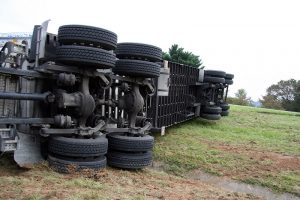
Jackknifing doesn’t just happen on slippery roads. Semi-trucks can get into this dangerous situation if certain precautions aren’t taken.
Icy or wet roads certainly present dangerous conditions that semi-trucks can likely jackknife on if not careful. However, with the brunt of wintry weather behind us, can semi-trucks still jackknife when poor road conditions are less likely to play a factor? In short, yes. In nearly all cases where bad weather or road conditions don’t play a role in causing a jackknifing incident, drivers of semi-trucks could have prevented the jackknife from happening. Here are a few ways not related to bad weather and slippery roads that can cause a semi-truck to jackknife, as well as some tips for drivers when operating their vehicle.
What is Jackknifing?
A jackknife in trucking is when the trailer and the cab become unaligned. Usually, the trailer swings and collapses forward with the cab, similar to how a pocket knife folds in when it closes. By then, the truck driver has lost control of the semi-truck, as the momentum of the trailer continues to travel until it collides with the cab or other things on the road. Jackknifing starts typically with the trailer skidding and not following the same direction as the cab.
Sudden Braking
Sudden braking is the greatest culprit leading to out-of-control semi-trucks and jackknifing. Gradually braking and slowing down is best since a truck needs more time and distance to reduce its speed. By slamming the brakes, the cab might screech to a halt, but the trailer’s momentum will continue to travel forward and collide with the cab.
Not Minding Speed or Following Distance
It’s prudent to travel at safe speeds and maintain ample following distance when it comes to driving semi-trucks. This tip goes hand-in-hand with avoiding sudden braking since those who drive too fast for given traffic conditions or too closely behind another vehicle put themselves in a situation where sudden braking is more likely to happen.
Light Truck Loads
A semi-truck’s powerful brakes are designed to slow and stop heavy trucks. When a driver is hauling an empty or lighter load, they are actually more likely to jackknife with an underweight trailer. A heavier trailer can help the semi-truck maintain sufficient traction with the ground and keep the container traveling behind the cab.
Bad Brakes and Tires
Proper vehicle maintenance is essential for several other safety reasons, but it can be especially crucial to preventing jackknifes. Make sure the brakes are working correctly and that the tires are in good condition. Otherwise, the semi-truck can skid even when the truck driver is following other safe trucking protocols.
Going Around Curves
Going around curves calls for a change in traveling direction. When navigating curvy roads, use reduced speeds so that the cab and trailer can both continue in the desired direction. Going too fast can throw a heavy vehicle or trailer off balance.
For All Your Trucking Needs
Follow us here at Evan Transportation to get more updates on driving tips and the trucking industry. Evan Transportation provides trucking and transportation services for clients throughout the Mid-Atlantic region. All of our drivers and staff are offered competitive salaries, benefits, and are guaranteed to be home every day. Interested in finding out more? Visit us online or give us a call at 443-673-3365. For even more information, visit us on Facebook, Twitter, Pinterest, and LinkedIn.
